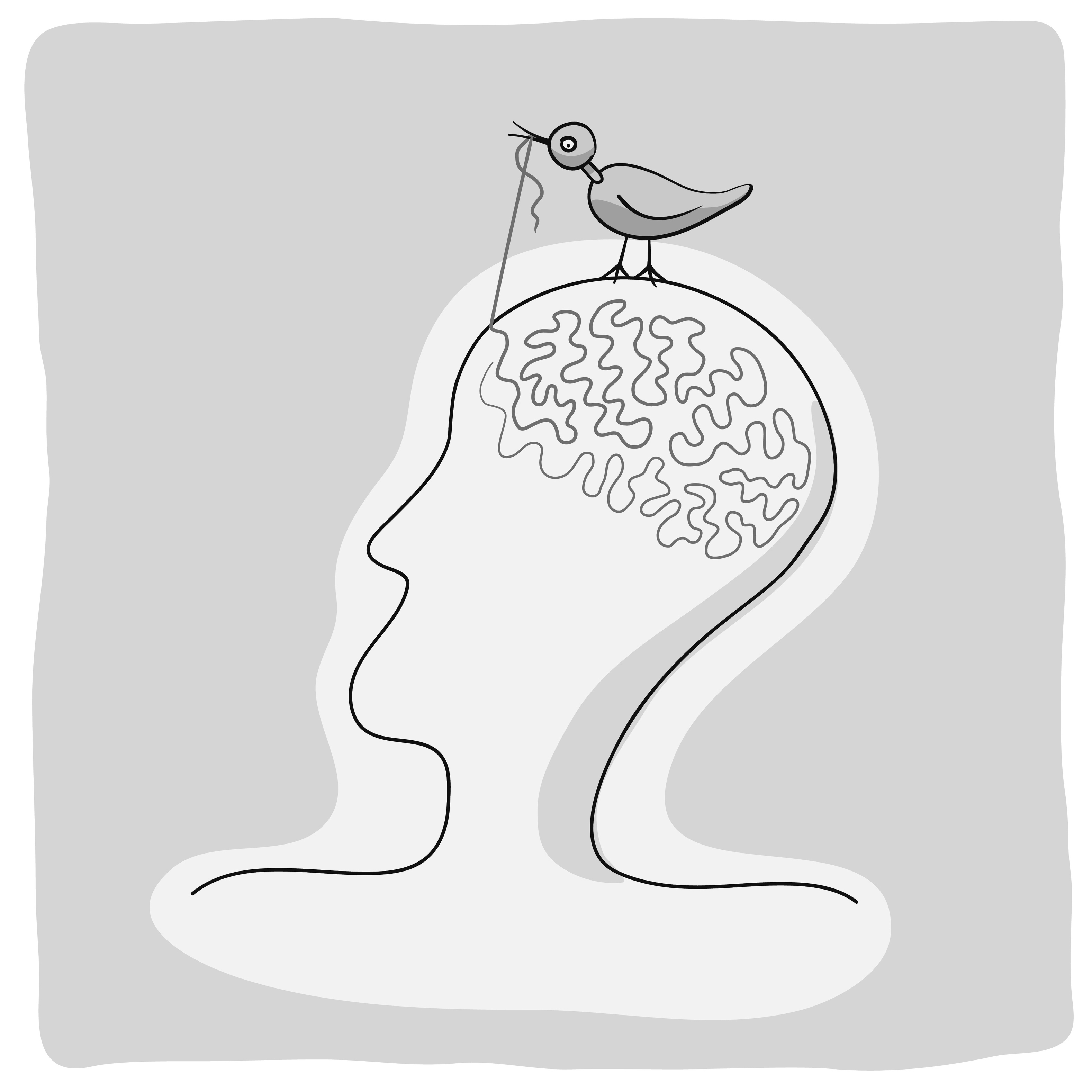You have likely heard the expression “ear worms” for those nasty little tunes or musical phrases that get inside a person’s head and replay over and over, much to his or her annoyance. Yet we can’t easily put a stop to them.
Psychologists, to my knowledge, have given no thought to what this phenomenon is actually teaching us: that the mind is capable of forcing a thought loop on us, without our consent, and without our understanding of where these impositions come from. Surely, this is an important aspect of thinking, which afflicts us in more ways than just recurring jangly musical phrases?
What about “thought worms”? It must be obvious that if music can thrust itself unwanted into the mind, so can non-optimum thoughts, feelings, attitudes and stupid behaviors.
[Did you notice there: I just described everything that’s wrong with human beings?]
So, what I am calling thought worms, or mind worms, are of crucial importance to us. They can utterly dominate our experience of life…
Isn’t that beautiful? (yes, but I’m no good)
I love you (yes, but I’m no good)
I think I can succeed at this (yes, but I’m no good)
He loves me! (yes, but I’m no good)
I passed my exams with top marks! (yes, but I’m no good)
It’s like a recording that’s stuck and replays over and over.
Isn’t that what a lot of our mind rattle is like? Monkey mind chatter, some people call it: those nagging or recurring thoughts at the back of our minds, that parasitize everything we are thinking and doing?
These thought worms are almost limitless: intemperate anger, inappropriate depression, impatience, rude to others, agitated and can’t sit still for long, measly sexual encounters, tendency to lie, afraid of heights, insecure, anxious… the list is infinite.
Some of these thought worms are self-serving: what I call self-serving righteous computations (SSRCs). These are dangerous thought loops that we use to justify what we are doing at every turn; thought worms that exist make us right and make others wrong. They can be just as stubborn as ear worms. But they can get you into a whole bunch of trouble.
“I know best”, “You stupid jerk” or “Dammit, what do you think you are doing?” kind of conversations don’t go down well with others. It’s self-righteousness at its worst.
Other thought worms can be carriers for emotions and feelings:
Life is great (but if only…)
Fill in whatever you like after the if-only. In this way, one simple thought loop can trigger a whole bunch of unpleasant emotions: depression for example, anger, frustration or anxiety.
We all experience this phenomenon but almost everyone accepts thought worms as something inevitable and which can’t be fixed. No matter how hard we try to shake them off, thought worms seem, by their nature, very persistent little beasts! That’s a pity, because they can be eradicated! Supernoetics® and my Punk Psychology® will see to that.
Types Of Thought Worms
Scientists like to think that listing and naming things (classification) is learning about them. That’s not really true. But it might help identify the existence of a phenomenon, if we at least know what to look for.
Obvious types of thought worms would be:
• Inappropriate and intemperate emotions (out of context, out of control)
• Irrationality, including fixed ideas
• Thought viruses (memes)
• Strange, often destructive, behaviors that do not serve
• Spiritual entities or hearing voices
Out of control emotions are the bane of human life. In the times everyone else was happy and getting on with life, we were just moping and sad for no obvious reason. Or the children come in with muddy feet and father explodes into a rage, screaming and threatening them with dire punishment, so they learn to fear him. And why is profound happiness—a rare event—often a trigger for “tears of joy”. Doesn’t that strike you as odd?
Irrationality is one of the hallmarks of human thoughts. We are not taught logic at school, even though the Ancient Greeks established it as absolutely vital to intelligent life. So we flounder and speak in nonsense terms, or non-sequiturs (things which don’t follow on from one another but we treat them as if they did).
Fixed ideas means just that: something a person thinks (usually very wrong) that he or she refuses to inspect and correct. For them it’s just “true”. All blondes are gold diggers, is a fixed idea that is wrong. The person at this mental level is not thinking in any advanced sense, merely reacting (like a knee-jerk response).
Memes. Most people have heard of thought viruses or memes: an idea, belief or verbal phrase that gets passed from person to person, mind to mind, and “infects” the other person’s thoughts. “Destroy America” is a thought virus that has strongly taken root in Middle Eastern fundamentalist communities.
Strange behaviors can be as extreme as serial killing or as stupid and innocuous as obsessive hand-washing. Slapping and punishing children is an irrational behavior, because the parent did all that once upon a time. Committing harmful or antisocial acts because you can “get away with it”, is stupid; you never escape the consequences of your actions. They will always come back within, to bite you if you do wrong.
Spiritual or psychic entities may need more explanation. Don’t get confused with “possession” stories that the Catholic Church loves to circulate. There are no real demons. Spiritual entities are non-material, much as our own spirits are, so discarnate (no-body) entities cannot be expected to produce any harm whatever, unless the person in contact decides to accept the threat and make it real.
Have you ever had the experience of not being listened to? Ignored, when you had something vital to say? Maybe you too felt a strong urge to scream abuse and throw things, like a poltergeist! That’s because these spiritual entities are just like us. Trying to get attention is a natural reaction.
The truth is, most spiritual entities are lost souls, hanging on to an identity which belonged to the former body, and many are upset, confused, or angry that no-one will listen to them. Often turning them around, to become friendly and even helpful, is just a matter of listening and acknowledging the message that is coming through. We don’t need to resort to extremes like exorcism.
Oh yes, disembodied souls are there alright. And “mad” people who hear voices are not mad. They don’t need medication. They just need to talk to their “voices”; find out what they want; and honor their presence as real, not parasitical “fleas”, as psychiatrists insist.
Fractal Memory
We all go through life having stressful encounters and sometimes these can be very heavy indeed. We would be correct to call it psychic wounding. Trouble is, these wounds from the past tend to bleed into the present. Indeed, a sufficient shock in the NOW can start a repeat hemorrhage from a past psychic wound. Then we get screwed up all over again.
I believe I am the first person to point out the fractal nature of memory: each time it gets stirred up with a new shock, a new activation of the wound, it adds to the original memory. Each iteration, as it’s called, further compounds and reinforces the problem—the distemperate emotion, dysfunctional behavior, or whatever.
And isn’t that what we see? Someone doing something foolish or destructive will tend to repeat the action over and over (especially if challenged), as if trying to be right. So there is no resolution.
Punk Psychology® has the ultimate modern version of mental wound healing. It’s based on 21st century science, from modern researchers like Steve Ramirez of Harvard University. This is not Freud or psychoanalysis!
My Supernoetics© writings explore this theme in detail. For the moment let’s just say it is a recursive memory technique (one that goes round and round, till drained of all charge). The principle is that something bigger than you hurt you. Just hiding and avoidance leaves you helpless and subject to continued stress from the same source. Whereas confronting the horrid details and the pain, avoiding any resistance but being willing to let them surface and be viewed openly, allows them to be purged from the system.
[purge: meaning rid (someone or something) of an unwanted quality, condition, or feeling; as in “Bob had helped purge Martha of the terrible guilt that had haunted her”. Oxford dictionary. Note that purge is related directly to the word purify]
This is similar to what Freud and his followers called abreaction or catharthis but there is one totally modern twist to this, which you’ll need to read about. Why not get yourself a copy of my book Punk Psychology?
This essay was edited from my book PUNK PSYCHOLOGY. Part 2 next week!
Have a nice, stress-free day!
To Your Good Health,Prof. Keith Scott-Mumby
The Official Alternative Doctor






